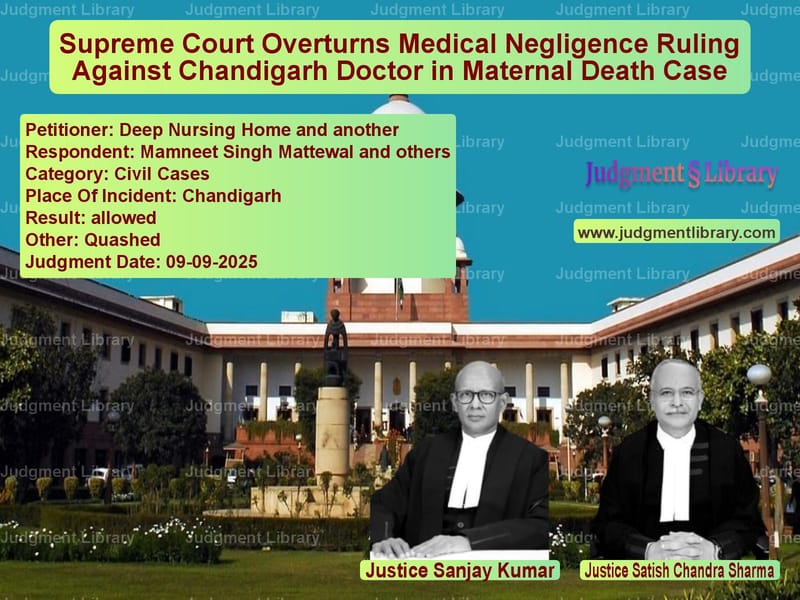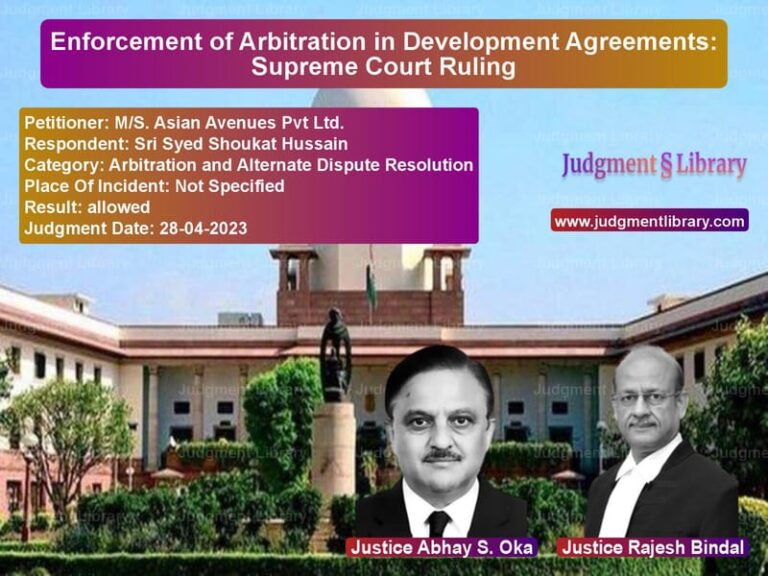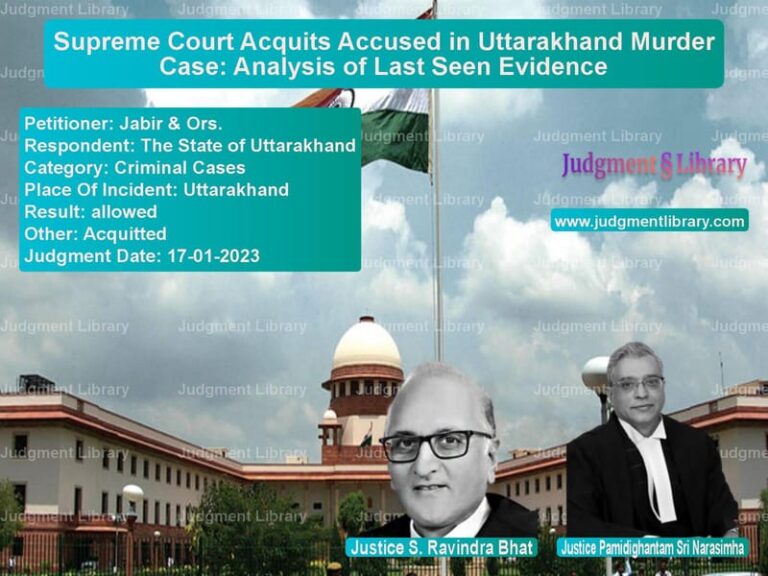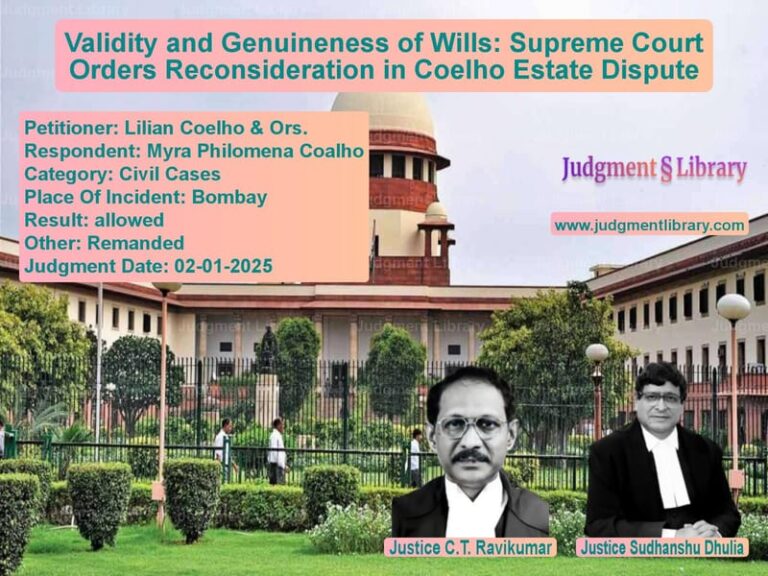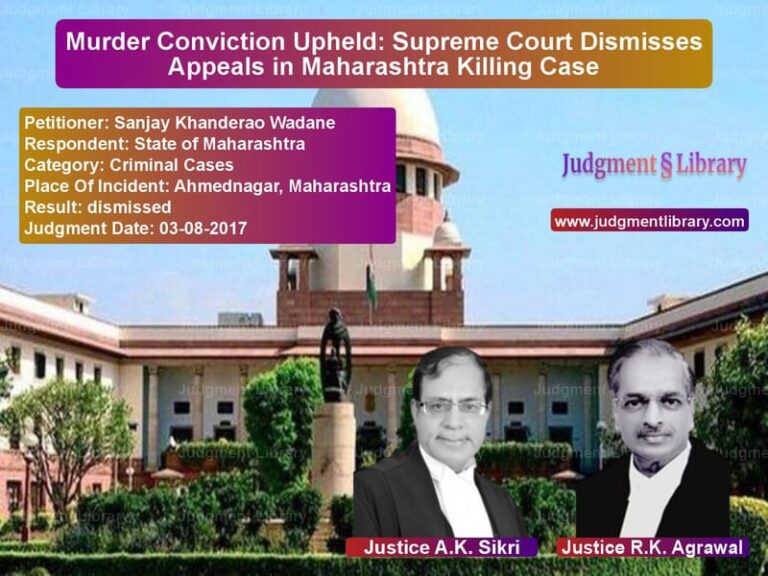Supreme Court Overturns Medical Negligence Ruling Against Chandigarh Doctor in Maternal Death Case
In a landmark judgment that underscores the importance of evidence-based decisions in medical negligence cases, the Supreme Court of India has overturned rulings that held a Chandigarh-based gynecologist responsible for the death of a patient following childbirth. The case involved Dr. Kanwarjit Kochhar of Deep Nursing Home, who was accused of medical negligence leading to the death of Charanpreet Kaur, a 32-year-old bank manager, shortly after she delivered a baby who also did not survive.
The tragic incident occurred on December 22, 2005, when Charanpreet Kaur was admitted to Deep Nursing Home in Chandigarh for delivery. She gave birth to a baby boy at 2:40 AM, but the newborn did not cry and was declared dead at 3:10 AM despite resuscitation efforts. Shortly after delivery, Charanpreet Kaur developed atonic Post Partum Haemorrhage (PPH), a condition where the uterus fails to contract properly after childbirth, leading to severe bleeding. Despite blood transfusion and emergency measures, her condition deteriorated, and she was transferred to the Post Graduate Institute of Medical Education and Research (PGI) in Chandigarh, where she was declared “brought dead” upon arrival.
The husband, Manmeet Singh Mattewal, filed a complaint before the State Consumer Disputes Redressal Commission (SCDRC), alleging medical negligence. He claimed that the nursing home was “inadequately and ill equipped” to handle emergencies during deliveries, that there was delay in arranging blood transfusion, and that no qualified doctor accompanied the patient during transfer to PGI. The SCDRC, in its judgment dated January 31, 2007, found Dr. Kochhar and the nursing home medically negligent and directed them to pay compensation of ₹20,26,000 along with interest and costs.
When the matter reached the National Consumer Disputes Redressal Commission (NCDRC), it took a different approach. While absolving the nursing home of liability, the NCDRC pinned the entire responsibility on Dr. Kochhar but on entirely new grounds that were never part of the original complaint. The NCDRC held that though there was no medical negligence in the actual delivery and post-delivery management, Dr. Kochhar was negligent in the antenatal care for not prescribing proper haematological tests.
This prompted Dr. Kochhar and Deep Nursing Home to approach the Supreme Court. The bench comprising Justices Sanjay Kumar and Satish Chandra Sharma heard the appeal and delivered a comprehensive judgment that examined multiple aspects of medical negligence jurisprudence.
The Supreme Court noted a crucial fact that five different Medical Boards, constituted at the behest of Manmeet Singh Mattewal himself, had examined the case and consistently opined that there was no gross medical negligence in the management of the patient. The first Report dated January 23, 2006, from Government Hospital, Sector 16, Chandigarh, stated that “the patient had died because of severe atonic PPH which did not respond to the treatment given at the nursing home” and that “blood is not arranged beforehand for normal deliveries.”
The subsequent reports from Government Medical College and Hospital, Sector 32, Chandigarh, all reached similar conclusions. The third Report dated April 3, 2006, explicitly stated that “there was no gross medical negligence in the management of the patient.” The fourth Report dated August 18, 2006, from a seven-doctor committee concluded that “there did not appear to be any gross medical negligence in the management of the patients by the treating doctors.” The fifth and final report also affirmed that “there was no gross medical negligence in the management of the patients.”
The Supreme Court made several important observations about the legal principles governing medical negligence cases. Quoting from established precedents, the court stated: “Simply because a patient did not favourably respond to the treatment given by a physician or if a surgery failed, the doctor cannot be held liable per se by applying the doctrine of res ipsa loquitur.” The court further emphasized that “Courts and Consumer Fora are not experts in medical science and must not substitute their own views over that of specialists.”
In another significant observation, the court noted: “Unless a complainant is able to establish a specific course of conduct, suggesting a lack of due medical attention and care, it would not be possible for the Court to second-guess the medical judgment of the doctor on the line of treatment which was administered and, in the absence of such material disclosing medical negligence, the Court cannot form a view at variance, as every death in the institutionalised environment of a hospital does not necessarily amount to medical negligence on a hypothetical assumption of lack of due medical care.”
The Supreme Court strongly criticized the NCDRC for building up a completely new case that was never pleaded by the complainant. The court observed: “The entire focus of the NCDRC, however, was only upon the antenatal care and management of the patient and its pinpointed findings were also in relation to the said period and treatment only. The NCDRC’s observation that there were several instances of departure from standard protocols in the antenatal management of the patient, such as, not getting proper tests done, and its final finding that no case of tortious medical negligence was made out against Dr. Kanwarjit Kochhar in handling Charanpreet Kaur’s labour, her delivery, management of the baby and his problem, and the post-delivery management of both of them at the nursing home, demonstrated and settled in no uncertain terms that the case put forth by Manmeet Singh Mattewal was not proved and established.”
The court further stated: “Once his case, as pleaded and projected, was not made out, the NCDRC clearly erred in building up a new case on his behalf and in pinning negligence and liability upon Dr. Kanwarjit Kochhar in the context of antenatal care and management of the patient, which was never the subject matter of the complaint case. In doing so, the NCDRC overstepped its power and jurisdiction as it was not for it to travel beyond the pleadings in the complaint case and build up a new case on its own.”
Citing established legal principles, the Supreme Court emphasized: “It is well settled that the decision of a case cannot be based on grounds outside the pleadings of the parties and it is the case pleaded that has to be found.” The court also noted that “the object and purpose of pleadings is to enable the adversary party to know the case it has to meet as, in order to have a fair trial, it is imperative that a party should settle the essential material facts so that the other party may not be taken by surprise.”
The Supreme Court allowed the appeal and set aside the orders of both the NCDRC and SCDRC, dismissing the original complaint case. The court also directed Manmeet Singh Mattewal to return the ₹10,00,000 received during the litigation to Dr. Kochhar and the insurance company in monthly installments of ₹1,00,000 each.
This judgment serves as an important precedent in medical negligence jurisprudence, reinforcing that consumer forums cannot travel beyond the pleadings to create new cases, and that medical professionals cannot be held negligent merely because a treatment was unsuccessful, especially when multiple expert committees have cleared them of negligence allegations. The decision highlights the importance of evidence-based conclusions in medical negligence cases and the need for judicial bodies to respect the boundaries of their jurisdiction when dealing with specialized medical matters.
Petitioner Name: Deep Nursing Home and another.Respondent Name: Mamneet Singh Mattewal and others.Judgment By: Justice Sanjay Kumar, Justice Satish Chandra Sharma.Place Of Incident: Chandigarh.Judgment Date: 09-09-2025.Result: allowed.
Don’t miss out on the full details! Download the complete judgment in PDF format below and gain valuable insights instantly!
Download Judgment: deep-nursing-home-an-vs-mamneet-singh-mattew-supreme-court-of-india-judgment-dated-09-09-2025.pdf
Directly Download Judgment: Directly download this Judgment
See all petitions in Medical Malpractice
See all petitions in Consumer Rights
See all petitions in Compensation Disputes
See all petitions in Other Cases
See all petitions in Judgment by Sanjay Kumar
See all petitions in Judgment by Satish Chandra Sharma
See all petitions in allowed
See all petitions in Quashed
See all petitions in supreme court of India judgments September 2025
See all petitions in 2025 judgments
See all posts in Civil Cases Category
See all allowed petitions in Civil Cases Category
See all Dismissed petitions in Civil Cases Category
See all partially allowed petitions in Civil Cases Category

